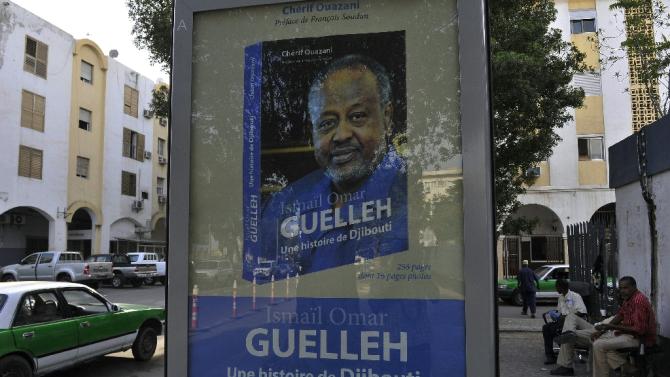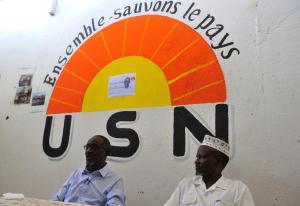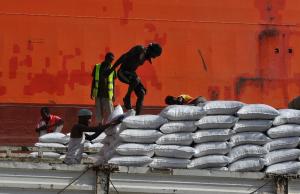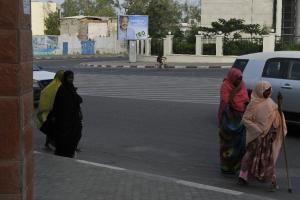Djibouti (AFP) - After 17 years under his rule, few doubt Djibouti's President Ismail Omar Guelleh will fail to win a fourth term in polls next week, with a divided opposition already calling the vote a sham.
Supporters of Guelleh -- president since 1999 of the tiny but strategic former French colony whose port guards the entrance to the Red Sea and Suez Canal -- are confident of victory in the April 8 vote.
Since campaigning began on March 25 portraits of "IOG", as Guelleh is nicknamed, have lined the baking hot streets of Djibouti city, capital of the arid Horn of Africa nation of some 820,000 people, where Guelleh supporters parade in the green party colours of his Union for the Presidential Majority (known by its French acronym, UMP).
"We are optimistic, especially when we see that the opposition party is straggling", said Foreign Minister Mahamoud Ali Youssouf.
Guelleh won the last polls five years ago with 80 percent of the vote, after parliament changed the constitution in April 2010 to clear the way for a third, and now a likely fourth, term.
The main opposition group, the so-called Union for National Salvation (USN), is a collapsing coalition of opposition parties.
- Divided opposition -
Three of the seven parties that made up the USN have decided to boycott the polls entirely -- the Movement for Democratic Renewal and Development (MRD), the Republican Alliance for Democracy (ARD) and Movement for Development and Freedom (MODEL) -- while the remaining parties are fielding two competing candidates, Mohamed Daoud Chehem and Omar Elmi Khaireh.
"Our party has decided not to participate in the election because we consider it to be a sham election, the minimum requirements of transparency are not guaranteed," said MRD leader Daher Ahmed Farah.
After parliamentary elections in 2013 which Guelleh's UMP won with 49 percent amid furious opposition claims of fraud, parties had demanded the creation of an independent electoral commission, a key element of a 2014 pact to resolve a political deadlock and end street protests.
Under that deal the opposition agreed to accept just 10 members of parliament -- instead of the 52 they claimed to have won -- in exchange for government commitments to better protection for opposition parties and the establishing of an independent election body. But the commission was not created.
"The MRD has never believed in the sincerity of this agreement," said Farah, who said the government had only wanted, "to stop the protests and demobilise the opposition."
But those who are taking part in the polls next Friday say a previous decade-long boycott -- from 2003 to the last polls in 2013 -- has only allowed the ruling party a free hand.
"We saw that we had not advanced", said presidential hopeful Chehem.
The other USN candidate, Omar Elmi Khaireh, argues there is a need for "change" after "38 years of dictatorship" since independence from Paris in 1977.
But their erstwhile USN allies suggest the real motivations of the candidates in challenging the 68-year old Guelleh are less noble.
- 'No change, no development' -
"There are other ulterior motives," suggests MRD's Farah, suggesting their taking part is to give a veneer of respectability to the elections, and that the candidates are hoping for a share of power later.
Participating in elections "is a way of legitimising the current president", added Abdillahi Zacharia, president of the Djiboutian League of Human Rights (LDDH), and also an USN member.
"This election result is locked in, it is taken for granted," he said.
Situated on one of the world's busiest shipping routes, Djibouti is already home to Camp Lemonnier, the US military headquarters on the continent used for covert, anti-terror and other operations in Yemen, Somalia and elsewhere across Africa.
France and Japan also have bases in the port, as well as European and other international navies as a base in the fight against piracy from neighbouring Somalia.
Djibouti, overwhelmingly Muslim and split between the majority Somali people and Afar, has embarked on major infrastructure projects, some backed by China which is also setting up a military base.
But while the port nation enjoys solid growth of six percent a year, according to the World Bank, unemployment is high at some 60 percent, and almost a quarter of the people live in poverty.
In the suburbs of the capital, there is deep anger towards the government, but few risk speaking out openly.
"Djibouti's youth want change... for 40 years, we have seen no change, no development,", said Beuh, one of the many frustrated unemployed in the city.






